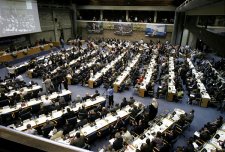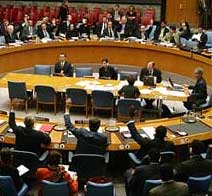By David Heller (Posted: March 4, 2009)
During its annual meetings in February, the UNEP Governing Council failed to adopt guidelines that would have directed developing country governments to create national legislation that respects and protects access principles. Unfortunately, adoption was postponed until the Council’s next set of meetings in 2010 because of a flawed UNEP process that neglected to include civil society organizations and developing countries in the process of drafting the guidelines.
Though on its face this development is a significant setback for access advocates, other news from Nairobi leaves ample reason for hope: failure was not due to fundamental opposition to access principles, and the U.S. no longer stands in the way of such a global access movement from happening.
Adoption would have been a concrete step towards ensuring all global citizens have the right to access information, participate in their government’s decision making process, and seek judicial redress in matters affecting the environment. Still, we cannot interpret their failure to adopt as a lack of respect for these principles.
Why?
Language in the decision also reflects an interest in using the guidelines to inform national law. In addition to “taking note of” the guidelines, the Council requested that the UNEP Secretariat “carry out further work on the guidelines with a view to the adoption by the [Governing Council] at its next special session.”
With adoption imminent, some “further work” is a necessary but ill-timed element of getting relevant parties to agree on proper guidelines; such preparatory activities should have been carried out prior to Nairobi.
We owe this pending setback to the flawed consultative process used by UNEP when it drafted the guidelines.
Though they were written by a select group of high-level experts and judges, UNEP failed to oversee a process of consultation where civil society and developing country delegations could deliberate on the guidelines’ merits and influence its content. Out of 192 member countries, for instance, only 40 participated in the drafting.
This lack of inclusion is especially troubling considering the burden that adopting these guidelines would entail for many nations. Since essentially states are being asked to graft a series of ambitious multilateral standards into their own domestic law, it’s logical that they’d want to have a say in the content of whatever it is that they’d be committing to.
Instead, most developing nations were simply presented with a finished product and asked to sign off on it in Nairobi.
It was no surprise then that during the meetings, developing nations representing the G-77 were the guideline’s most outspoken opponents. Sources privy to deliberation say that their reactions of disapproval stemmed from the aforementioned procedural issues; as opposed to disagreement with the guidelines’ substantive content.
These nations had little prior knowledge of the substance of the guidelines due to their lack of participation and consultation in their construction, and were understandably unwilling to undertake the burden of implementing what they had no hand in creating.
Noticeably absent from the list of opposing delegations were the E.U. and U.S. During deliberation, both influential parties supported adoption. Moreover, both acknowledged that the grievances expressed by developing nations were legitimate.
The U.S.’s position represents an about-face from previous policy under the Bush administration. This drastic change, according to Augustine Njamnishi,TAI coordinator in Cameroon and part of his country’s UNEP delegation, did not go unnoticed.
“Wholehearted U.S. support of the guidelines raised eyebrows and suspicions,” Njamnishi says.
U.S. officials must recognize the diplomatic anxiety that their changed policy preferences cause. The U.S. should fully explain the rationale behind its decisions, justifying votes with principled reasons that can be universally followed.
Despite this apparent improvement in U.S. policy towards governmental transparency, newly appointed UNEP Executive Director Achim Steiner was visibly disappointed by the Council’s decision to forego adoption, according to Njamnishi.
But this disappointment should not have been a surprise. By failing to include an overwhelming majority of UNEP members in the drafting of guidelines, the access principles promoted within these documents were ironically neglected by UNEP and absent from its method of guideline creation.
Seeing a silver lining in Nairobi’s outcome, some UNEP officials remarked that the further consultative work called for in the Governing Council’s decision would be a valuable learning experience for developing countries. While it pays to be optimistic, this doesn’t excuse the missed chances for consultation prior to Nairobi.
And we must be wary of assuming that the upcoming consultation will be any more inclusive than it was before. If UNEP’s halfhearted effort to extend an invitation to civil society and the developing world prior to Nairobi is any indication, their future involvement is far from guaranteed.
UNEP must learn from its mistakes and go to great lengths to include as many civil society and developing country representatives as possible in forthcoming consultations. Come the next Governing Council meeting, this will ensure more delegations will be presented with guidelines they’ll be more likely to support – those that they have agreed to and are fully prepared to implement.
Given its re-discovered priorities, the U.S. ought to embrace its global influence and lead this process.
The agenda is ambitious, but no more so than the goal.

